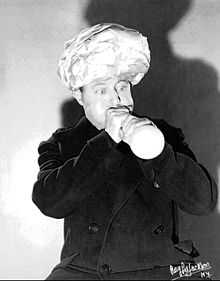Joe Cook (actor)

Joe Cook (1890 - May 15, 1959) rose to the highest echelon of vaudeville, headlining at New York's famed Palace Theatre. He triumphed on Broadway and then broke into radio. A household name in the 1920s and 1930s, Cook was one of America's most popular entertainers.
Born Joe Lopez in Evansville, Indiana in 1890, he was orphaned and adopted by relatives at the age of three. He lived in the back of the grocery store of his adoptive parents at the corner of Fourth and Oak in Evansville. Cook joined a circus in 1906 which propelled him to vaudeville, Broadway and Hollywood.[1]
Joe Cook's physical talents were remarkable. He was an incredible juggler, could walk a tightrope, ride a unicycle, mime, and perform many other circus skills with ease. With this he combined an uncanny ability to tell nonsensical stories that made audiences roar with laughter. Added to this was his penchant for creating ridiculously complex inventions to perform absurdly simple or totally useless tasks. Mix in a little piano, violin, and ukulele playing and you had quite a show. The broad variety of Cook's act lead to his nickname – "One Man Vaudeville." New York Times critic Brooks Atkinson once wrote, "Next to Leonardo da Vinci, Joe Cook is the most versatile man known to recorded times."
Following a very successful fifteen years in vaudeville, Cook became a musical comedy star on Broadway in the late 1920s and early 1930s, starring in such hits as Rain or Shine, Fine and Dandy, and Hold Your Horses. In 1930, noted columnist Walter Winchell wrote that "Joe Cook is certainly one of the musical theatre's three geniuses. I can't at the moment think of the other two."
Never a fan of Hollywood, Cook made only two full-length movies, which is a major reason he is not widely remembered today. In 1930, he starred in the film version of Rain or Shine (film), which was directed by a young Frank Capra and is still shown occasionally on television. It has recently been completely restored and will be permanently preserved by Sony Pictures, the successor of Columbia Pictures. Cook's only other feature movie, Arizona Mahoney, was filmed in 1936 and included a young Larry "Buster" Crabbe. The 1930s also saw Cook's successful transition into the new medium of radio, as the host of two variety series and a frequent guest on many others.
His most famous comedy skit was called the "Four Hawaiians.". In the act, Cook would explain that he was actually imitating only two Hawaiians. He "could imitate four Hawaiians but did not wish to do so because that would put all the performers would could only imitate two Hawaiians out of work." Cook would appear on stage with a ukulele in hand and begin:
"I will give an imitation of four Hawaiians. This is one [whistles]; this is another [plays ukulele]; and this is the third [marks time with his foot]. I could imitate four Hawaiians just as easily, but I will tell you the reason why I don't do it. You see, I bought a horse for $50 and it turned out to be a running horse. I was offered $15,000 for him, and I took it. I built a house for the $15,000, and when it was finished, a neighbor offered me $100,000 for it. He said my house stood right where he wanted to dig a well. So I took the $100,000 to accommodate him. I invested the $100,000 on peanuts, and that year, there was a peanut famine, so I sold the peanuts for $350,000. Now why should a man with $350,000 bother to imitate four Hawaiians?"
Cook made his residence at Lake Hopatcong, in Hopatcong, New Jersey from 1924-1941 which was then a popular resort. His house was appropriately named "Sleepless Hollow" for the many parties he gave and celebrities he entertained.[2] His house still survives at Lake Hopatcong but is not open to the public.
Cook was diagnosed with Parkinson's Disease in 1941. This forced his retirement from show business. He sold the lake house the same year and moved to a more modest residence in New York State, where he resided until his death in 1959. Had Cook stayed healthy until the advent of television, his playful and physical style of comedy might well have made him one of the new medium's biggest stars, as was the case with his contemporary, Milton Berle.
References
- ↑ "Evansville native Joe Cook made the big time". Evansville Courier & Press. Retrieved 2007-03-17.
- ↑ History, Borough of Hopatcong. Accessed February 1, 2011. "The center for much of this activity was Joe Cook's Sleepless Hollow in Hopatcong's Davis Cove. Cook was a popular Vaudevillian, comedian and musical theater star who lived at the Lake from 1924 to 1941."